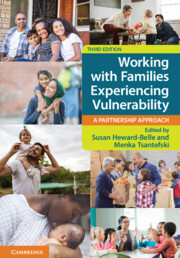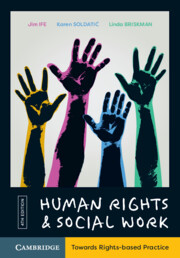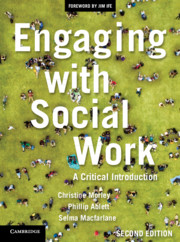Working with Families Experiencing Vulnerability
Vulnerability is not a fixed state; people and families can move in and out of experiencing vulnerability throughout their lives. All families are at risk of experiencing vulnerability at some point, which means that social workers and other professionals must be equipped with the skills to effectively provide them with support. Working with Families Experiencing Vulnerability: A Partnership Approach provides a comprehensive, evidence-based guide to family-centred practice for the social work, human services, health and education professions. This edition has been comprehensively revised and features new chapters on working with families affected by natural disasters, families experiencing poverty, Māori families, LGBTQIA+ families and families where a parent has an intellectual disability. Emphasis is placed on promoting a rights-based, relational approach to working with children and young people, who are most at risk of experiencing vulnerability. Each chapter includes case studies, reflective questions and activities.
- The new edition has been substantially revised, including new chapters that explore contemporary topics including working with families affected by natural disasters, parenting in a new land, transitions to parenthood, parenting with intellectual disability and supporting people of diverse genders and sexualities
- Provides a current, evidence-based approach to family-centred practice for students across the social work, health and education professions
- Student learning is supported through a broad suite of pedagogical features in each chapter, alongside new online resources to complement the text
Product details
May 2023Adobe eBook Reader
9781009218351
0 pages
This ISBN is for an eBook version which is distributed on our behalf by a third party.
Table of Contents
- 1. The context for practice with children, young people, and their families Menka Tsantefski and Susan Heward-Belle
- 2. Person-centred, relationship-based practice Susan Heward-Belle, Brigid Lang-Norris, Pam O'Connor, Lauren Redmile and Susan Brown
- 3. Working within and between organisational boundaries Dorothy Scott
- 4. Poverty and its impacts on children and families Peter Matthewson, Paul Harris and Menka Tsantefski
- 5. Attachment theory Amy Conley Wright and Peiling Kong
- 6. Engaging with fathers for the care and safety of families Susan Heward-Belle and Patrick O'Leary
- 7. Parenting in a new land Asukulu Bulimwengu and Pooja Sawrikar
- 8. Working with parents with problematic substance use and mental health issues Sharon Dawe, Paul Harnett and Elizabeth Eggins
- 9. Children in the midst of family violence Larissa Fogden, Cathy Humphreys and Menka Tsantefski
- 10. Supporting children and families affected by disasters Elizabeth A. Newnham, Enrique Mergelsberg, Lauren Kosta, Katitza Marinkovic Chavez, Jonathan Bullen, Jane Nursey and Lisa Gibbs
- 11. Working with families in pregnancy Jo Spangaro
- 12. Working with children: a rights-based, relational approach to practice Menka Tsantefski and Mary Jo Mc Veigh
- 13. Understanding young people Jioji Ravulo
- 14. Parenting with intellectual disability Susan Collings and Margaret Spencer
- 15. Family-led decision-making approaches with Aboriginal and Torres Strait Islander families Lynette Riley, Sarah Ciftci and Irene Wardle
- 16. Working with Māori whānau (families) Sharyn Roberts
- 17. Supporting people of diverse genders and sexualities Peter Matthewson and Ives Rose
- 18. Working with kinship care families Ann MacRae and Dave Vicary.








